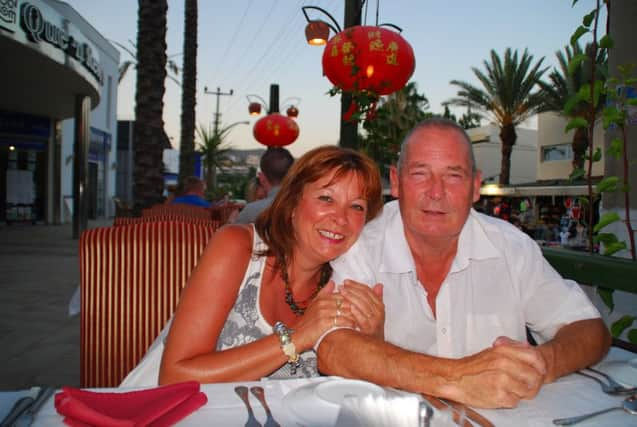Grieving unmarried woman to take government to court over bereavement damages


“We were no different from any other married couple,” said Jakki.
“We were totally committed to each other and everything we did, we did together.”
Advertisement
Hide AdAdvertisement
Hide AdNow, five years later, Jakki, from Chorley, who lived with John for 11 years prior to his death, has launched a landmark legal fight to improve the rights of unmarried couples.
The 58-year-old NHS worker is taking the government to court for breaching her human rights.
And although Jakki has been left devastated by John’s death, she said she is not doing this for herself.
“Changing the law won’t make a difference to me now,” she added. “But I want to do it because it will matter to people in the future because society is changing.
Advertisement
Hide AdAdvertisement
Hide Ad“I am campaigning for the law to be changed – I want the government to recognise that long-term relationships are just as committed as those who have gone through a formal ceremony.”
A fixed sum of £12,980 is paid if a person dies as a result of negligence – but only to spouses or civil partners.
But the mum-of-one only discovered she wasn’t entitled to the statutory award after John’s death.
Dad-of-three John, a retired prison governor who worked at HMP Preston, died aged 66 in 2011 after an infection was missed by medics and spread to his brain.
Advertisement
Hide AdAdvertisement
Hide AdDoctors placed John in the psychiatric unit and he died two days later.
“When he died, we didn’t know why, and that was the hardest thing for me.
“I felt a lot of grief but also anger because I knew something more could have been done,” said Jakki.
“I couldn’t grieve properly at the time because we were fighting for him because we didn’t think he had been treated properly.”
Advertisement
Hide AdAdvertisement
Hide AdIn 2014, the inquest revealed John’s death was the result of medical negligence, which is when Jakki discovered she was not entitled to the bereavement damages.
“I felt very disappointed that society didn’t see my grief the same as anybody who had been married to the person they loved,” she said.
“It’s very upsetting to realise the government doesn’t recognise that a committed relationship is valid. It was like being told I couldn’t be bereaved or grieve for him.”
Jakki said it made her relationship feel more like a “business arrangement”.
Advertisement
Hide AdAdvertisement
Hide AdBoth Jakki and John had been through failed marriages in the past and didn’t think it was necessary to get married.
She added: “We didn’t need to go through a ceremony to prove we were committed to each other because we knew we were.
“But norms are changing and people have a choice whether or not to get married.”
In the case against the Secretary of State for Justice, which is due to be heard later this year, lawyers will argue that the current legislation violates articles 8 and 14 of the European Convention on Human Rights in that it discriminates against Jakki on the grounds of her marital status and her right to respect for private and family life.
Advertisement
Hide AdAdvertisement
Hide AdJakki said she feels nervous about the hearing but hopes it will all be worth it.
“Marriage rates are falling year on year, yet the law seems stuck in the past,” she said.
“If I do manage to make a change, I will feel relieved for people in the future.
“I have had loads of messages of support. For people in the future it could make a difference, and that’s what counts.”
Advertisement
Hide AdAdvertisement
Hide AdZak Golombeck (pictured) a human rights lawyer from Slater and Gordon, who is representing Jakki, said: “The loss of a long-term partner is absolutely devastating, yet for unmarried couples there is still no recognition of that loss in the eyes of the law.
“What we are seeking is a reinterpretation of the legislation to include those couples who have lived ‘as husband and wife’ for more than two years.
“The Law Commission has made previous recommendations to extend it to cohabitants as it has to civil partners.
“A wedding ring is no longer the only sign of commitment in a modern relationship and the law should be changed to reflect that.”
Advertisement
Hide AdAdvertisement
Hide AdThe case is just the latest to challenge the law over unmarried couples.
Mum-of-four Siobhan McLaughlin claimed her human rights had been breached when she was refused widowed parents’ allowance following her long-term partner’s death.
A judge in Northern Ireland found in her favour.
A heterosexual couple also called for a judicial review into whether they should be allowed to enter into a civil partnership.
Rebecca Steinfeld and Charles Keidan’s case was dismissed by a High Court judge in January, but the couple said they planned to appeal.
Advertisement
Hide AdAdvertisement
Hide AdIn Scotland, the law on bereavement damages already extends to cohabitees as well as other immediate family members such as parents or children.
A Ministry of Justice spokesman said: “Our sympathies remain with the loved ones of John Bulloch following his tragic death.
“While no payment can provide adequate financial compensation for the grief felt at the loss of a loved one, there are bereavement damages available to a person’s spouse or civil partner or to their parents if they were under 18. “There are no plans to change the law at this time.”
Her case will be heard in the Royal Courts of Justice in July.